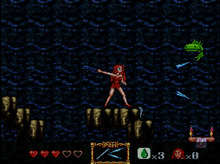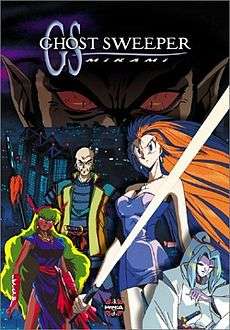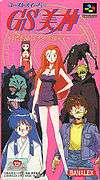Ghost Sweeper Mikami
| Ghost Sweeper Mikami | |
|
Cover of Ghost Sweeper Mikami DVD. | |
| GS美神 極楽大作戦!! (Gōsuto Suīpā Mikami Gokuraku Daisakusen!!) | |
|---|---|
| Genre | Comedy, Action, Supernatural |
| Manga | |
| Written by | Takashi Shiina |
| Published by | Shogakukan |
| Demographic | Shōnen |
| Magazine | Weekly Shōnen Sunday |
| Original run | 1991 – 1999 |
| Volumes | 39 |
| Anime television series | |
| Directed by | Atsutoshi Umezawa |
| Music by | Toshihiko Sahashi |
| Studio | Toei Animation |
| Licensed by | |
| Network | TV Asahi, Asahi Broadcasting Corporation |
| Original run | 11 April 1993 – 6 March 1994 |
| Episodes | 45 |
| Anime film | |
| Directed by | Atsutoshi Umezawa |
| Studio | Toei Animation |
| Licensed by | |
| Released | 24 August 1994 |
| Runtime | 60 minutes |
Ghost Sweeper Mikami: The Great Paradise Battle!! (Japanese: GS美神 極楽大作戦!! Hepburn: Gōsuto Suīpā Mikami Gokuraku Daisakusen!!) is a Japanese comedic horror manga series written and illustrated by Takashi Shiina. It was published by the weekly manga magazine Shōnen Sunday from 1991 to 1999. In 1993, it won the Shogakukan Manga Award for best shōnen manga. The series explores some folk religion themes such as possession, exorcism, shamanism, Yurei, and Yōkai.
The series was adapted as a 45-episode anime television series by Toei Animation called Ghost Sweeper Mikami (GS美神 Gōsuto Suīpā Mikami) which ran on TV Asahi and the Asahi Broadcasting Corporation from 1993–1994, covering most parts of the first nine volumes of the Manga (total 39 volumes). The anime lead to the release of a movie, which had been the only existence of Mikami in the United States (released by Manga Video). The TV series has been licensed by Sentai Filmworks.
Plot
Overdevelopment and crowding in Japan has forced many of its indigenous spirits and ghosts to lose their homes. Due to problems caused by the homeless spirits, a new profession was created, the Ghost Sweepers (GS). Private exorcists for hire, they serve only the highest bidder to survive in the cutthroat corporate world. Among this, the Mikami GS Company, led by 20-year-old Reiko Mikami and her two assistants, the 17-year-old boy Tadao Yokoshima and the ghost girl Okinu, is said to be the best.
The manga setup is scenario-to-scenario, with many plots intertwining classic Japanese culture and modern day realities, with occasional references to Western influences. In between these plots are some longer story arcs where new characters are introduced and the existing characters are further developed. There is no one ongoing storyline, therefore the plots are character-driven and serve to gradually develop characters, especially the main protagonists.
Media
Film
A 1994 anime film was produced by Toei. It acts as a sequel to the TV series.
Video games
| Ghost Sweeper Mikami: Joreishi wa Nice Body | |
|---|---|
|
Cover art of Ghost Sweeper Mikami: Joreishi wa Nice Body | |
| Developer(s) | Natsume |
| Publisher(s) | Banalex |
| Writer(s) | Takashi Shiina |
| Composer(s) |
Kinuyo Yamashita[1] Hiroyuki Iwatsuki[1] |
| Platform(s) | Super Famicom |
| Release date(s) | |
| Genre(s) | Platformer |
| Mode(s) | Single-player |

Two video games based on the manga and anime were spawned. In 1993 a video game entitled Ghost Sweeper Mikami: Joreishi wa Nice Body (ゴーストスイーパー GS美神 〜除霊師はナイスバディ〜) was released for the Super Famicom. In 1994 GS Mikami was published by Banpresto for the PC Engine. Ghost Sweeper Mikami: Joreishi wa Nice Body is a Japan-exclusive action video game based on the manga and anime Ghost Sweeper Mikami. It was developed by Natsume and published by Banalex, which was released in 1993.
Ghost Sweeper Mikami: Joreishi wa Nice Body is a side-scrolling platformer where the player controls Reiko through multiple stages.[3] Reiko is armed with a magic baton that can be used to perform several types of melee attacks. The baton can be powered up to shoot various types of projectiles, though these powerups are lost if Reiko takes any damage. It can also be used as a type of grappling hook to access certain platforms. There are also limited uses of magic attacks that hit all enemies on the screen.
See also
References
- 1 2 "Soundtrack Information". SNESmusic.org.
- ↑ Ghost Sweeper Mikami: Joreishi wa Nice Body at super-famicom.jp (Japanese)
- ↑ Ghost Sweeper Mikami: Joreishi wa Nice Body at MobyGames
External links
- GS Mikami Gokuraku Daisakusen!! (manga) at Anime News Network's encyclopedia
- Ha'nts and Critters, a review of Ghost Sweeper Mikami, Vampire Wars, and Psychic Wars.
- Animerica review
- Ghost Sweeper Mikami: Joreishi ha Nice Body at superfamicom.org
- GS Mikami: Joreishi ha Nice Body (Reviews) at GameFAQs
- GS Mikami: Joreishi ha Nice Body (FAQ) at GameFAQs

